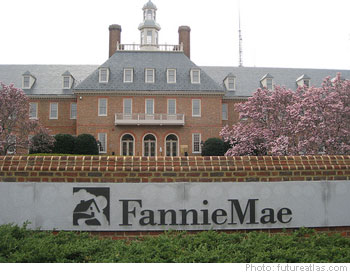 Fannie Mae’s (FNM) MyCommunity Mortgage was at the forefront of the credit crisis, and had many sub-programs, all targeted at low income communities and borrowers. These programs supposedly highlighted the mission that made these GSEs as essential: they were doing what the private sector would not, serve the historically underserved.
Fannie Mae’s (FNM) MyCommunity Mortgage was at the forefront of the credit crisis, and had many sub-programs, all targeted at low income communities and borrowers. These programs supposedly highlighted the mission that made these GSEs as essential: they were doing what the private sector would not, serve the historically underserved.
Unfortunately, lending to people without the ability or willingness to payback homeloans is not sustainable, something that seems obvious now, but try telling that the Boston Fed or the American Economic Review in the 1990s. The key is that MyCommunity Mortgage got bundled into Fannie’s ubiquitous DeskTop Underwriter, a mortgage origination program that made these abominations standard. Once they set this up (around 2000, with new twists every year), one can see how these bad ideas spread all over the industry. The method to process the innovative loans needed no extra work, and as to the ‘risk’: the regulators could not simultaneously view these loans as risky while another government branch created them, in the same way they can’t push affirmative action and sue firms for having de facto quotas.
If you read the archived websites you see that real estate agents knew exactly what these MyCommunity spawn implied. Says one broker:
they are a breeze to close! 6% seller concessions and a minium buyer contribution of $500??? I love it
On this mortgage website, they go over note things like how to get a loan without a job or even ‘with the worst credit history’.
One interesting aspect of this program is how disingenuous it is. They are 4 exceptions to having sufficient ‘traditional credit history’, with several pages of nuance often referring to another document entirely. They don’t say NINJA loans, but that’s what they mean. Such criteria are not meant to be read and understood, they just mean, if you wave this in front of someone (eg, regulator) no one will question you because you are probably correct (and we all know what the program wants–more poor people with houses). The practical credit criteria was merely a signature with an affirmation (‘yeah, sure I’ll pay you back’), as long as the borrower is sufficiently poor with sufficiently bad credit. It wasn’t adverse selection–taking on disproportionate bad credits inadvertently–it was active targeting the bad credits.
NINJA loans became a standard in large part because the leading player in mortgage underwriting embedded them in their ubiquitious, market dominating, mortgage origination software (Desktop Underwriter). Fannie wants another $10.6B, let’s note if anyone actually mentions they change they ways when writing this check.
- Bulenox: Get 45% to 91% OFF ... Use Discount Code: UNO
- Risk Our Money Not Yours | Get 50% to 90% OFF ... Use Discount Code: MMBVBKSM
Disclaimer: This page contains affiliate links. If you choose to make a purchase after clicking a link, we may receive a commission at no additional cost to you. Thank you for your support!


Leave a Reply